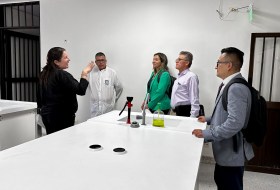News
We continue to consolidate ourselves as a high-quality institution: Academic peers from the CNA visited our Master's in Continental Hydrobiological Resources from the 5th to the 7th of July
On July 5 of the current year, at the facilities of our University's Council Hall, the visit by academic peers began as the National Accreditation Council (CNA) arranged a visit specifically aimed at the Graduate Program for the Master's in Continental Hydrobiological Resources. This program is in its final stage to obtain High-Quality Accreditation
The visit from the CNA represents a crucial step for our institution, as these processes ensure the necessary progress for the University of Cauca to undertake the challenging path toward obtaining High-Quality Re-accreditation, scheduled for the year 2027. To comprehend the implications of such visits and their significance, Alexander Buendía, Director of the Center for Quality Management and Institutional Accreditation, notes, "Institutional accreditation depends on two pillars. One is the accreditation of the University as a whole institution, and the other pillar is that to achieve that recognition, a certain number of programs need to be accredited. Our goal is to accredit 60% of the programs. So, this visit by academic peers is aimed at achieving that percentage. Let's say these are two complementary processes."
It's important to mention that, according to Article 53 of Law 30 of 1992, "The National Accreditation System (SNA) is the set of policies, strategies, processes, and bodies whose fundamental objective is to ensure to society that higher education institutions within the system meet the highest quality requirements and achieve their purposes and objectives."
This regional seat of learning has been fulfilling the various steps associated with the re-accreditation process, scheduled for 2027, signifying undeniably diligent and committed work by each program. Currently, Unicauca boasts 32 High-Quality Accredited programs, with others in various stages of the process, such as the peer visit or nearing the completion of the evaluation document and resolution submission. This achievement fills us with pride, acknowledging the dedication from everyone involved to make it possible.
The Director of the Center for Quality Management and Institutional Accreditation emphasizes, "The most interesting aspect of the peer visit is the opportunity to engage in dialogue with academics from the field who come to observe from the outside and with whom we can have discussions that turn out to be very positive, useful for the continuous improvement of the programs and the institution. Therefore, the peer visit precisely helps us see where we are and how we can be better."
This visit concluded on the morning of Friday, July 7, with the full participation of institutional management expressing satisfaction at the completion of this crucial stage for our Master's in Continental Hydrobiological Resources. Public acknowledgment is extended to the staff who diligently prepared for and managed the visit, ensuring a positive outcome. We anticipate sharing the results and good news stemming from this phase undertaken last week.
In conclusion, we reiterate our commitment to academic excellence and continuous improvement of all processes, not only to maintain our High-Quality Accreditation but also to fulfill our main dream and objective: to educate professionals who are empathetic and dedicated to the social transformation of their region.


